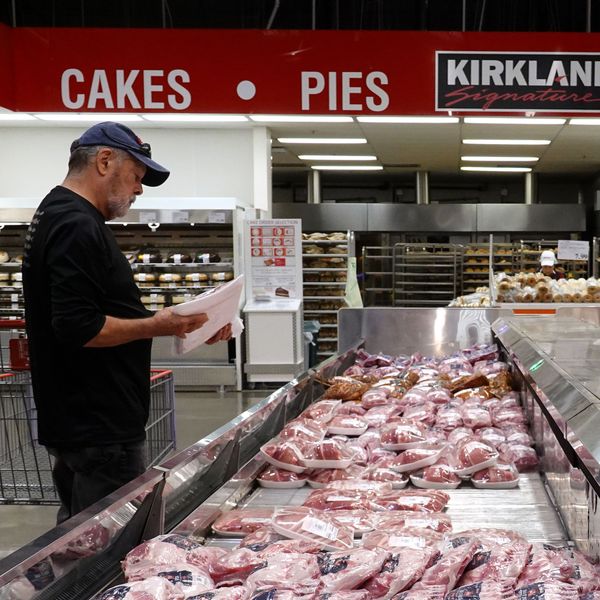It's Back: Is 'Pink Slime' on Your Child's Cafeteria Menu?
The beef product dubbed "pink slime" is on its way back into more school cafeterias this year, Politico reports.
The beef product dubbed "pink slime" is on its way back into more school cafeterias this year, Politico reports.

The beef industry is always looking for ways to cut corners, and so Beef Products Inc. devised a clever high-tech method to make money from what you and I would consider garbage, but what industry euphemistically calls "trimmings." But they had a couple of problems: it's very fatty and prone to bacterial contamination. Here is how ABC News described the process in its recent story:
"The 'pink slime' is made by gathering waste trimmings, simmering them at low heat so the fat separates easily from the muscle, and spinning the trimmings using a centrifuge to complete the separation. Next, the mixture is sent through pipes where it is sprayed with ammonia gas to kill bacteria. The process is completed by packaging the meat into bricks. Then, it is frozen and shipped to grocery stores and meat packers, where it is added to most ground beef."
"Through the weeks of media coverage we learned that pink slime," wrote Civil Eats' Paula Crossfield, "is a regular ingredient in the hamburgers used in school lunches and in 70 percent of the ground beef sold in supermarkets."
In the midst of the scandal, wrote nutritionist Andy Bellatti,
A petition drafted by blogger Bettina Elias Siegel to eliminate pink slime from school cafeterias quickly earned over 250,000 signatures.
In a victorious epilogue, 47 states did not purchase pink slime for the 2012-2013 school year, and ground beef processors saw production of the controversial ingredient -- and its sales -- plummet.
Plummeting sales after the news coverage prompted Beef Products Inc. to file a defamation lawsuit targeting, among other, ABC News, anchor Diane Sawyer and ABC correspondent Jim Avila.
On Monday, however, Bill Tomson and Helena Bottemiller Evich reported in Politico an uptick in sales of "pink slime" for school meals:
As of Sept. 3, seven states put in orders to the USDA for about 2 million pounds of beef that may contain the controversial product for the meals they serve in the 2013-14 school year. At this time last year there were only three states -- Iowa, Nebraska and South Dakota -- that had put in orders for beef that may contain lean finely textured beef.
Despite the "ick" factor of the product, Simon has pointed out that "pink slime is just one of many problems with industrialized meat," while Crossfield noted that the controversy "has exposed how food safety falls inevitably through the cracks in a country where over 9 billion animals are being slaughtered per year and budgets for the departments that oversee these processes are being slashed."
Tomson and Bottemiller Evich report using the "lean beef trimmings" brings the cost of ground beef down 3 percent, and "that as schools across the country grapple with tight budgets, some are changing their minds and accepting the lower-price alternative product that brings down the price of the food they serve."
_______________________
An Urgent Message From Our Co-Founder
Dear Common Dreams reader, The U.S. is on a fast track to authoritarianism like nothing I've ever seen. Meanwhile, corporate news outlets are utterly capitulating to Trump, twisting their coverage to avoid drawing his ire while lining up to stuff cash in his pockets. That's why I believe that Common Dreams is doing the best and most consequential reporting that we've ever done. Our small but mighty team is a progressive reporting powerhouse, covering the news every day that the corporate media never will. Our mission has always been simple: To inform. To inspire. And to ignite change for the common good. Now here's the key piece that I want all our readers to understand: None of this would be possible without your financial support. That's not just some fundraising cliche. It's the absolute and literal truth. We don't accept corporate advertising and never will. We don't have a paywall because we don't think people should be blocked from critical news based on their ability to pay. Everything we do is funded by the donations of readers like you. Will you donate now to help power the nonprofit, independent reporting of Common Dreams? Thank you for being a vital member of our community. Together, we can keep independent journalism alive when it’s needed most. - Craig Brown, Co-founder |
The beef product dubbed "pink slime" is on its way back into more school cafeterias this year, Politico reports.

The beef industry is always looking for ways to cut corners, and so Beef Products Inc. devised a clever high-tech method to make money from what you and I would consider garbage, but what industry euphemistically calls "trimmings." But they had a couple of problems: it's very fatty and prone to bacterial contamination. Here is how ABC News described the process in its recent story:
"The 'pink slime' is made by gathering waste trimmings, simmering them at low heat so the fat separates easily from the muscle, and spinning the trimmings using a centrifuge to complete the separation. Next, the mixture is sent through pipes where it is sprayed with ammonia gas to kill bacteria. The process is completed by packaging the meat into bricks. Then, it is frozen and shipped to grocery stores and meat packers, where it is added to most ground beef."
"Through the weeks of media coverage we learned that pink slime," wrote Civil Eats' Paula Crossfield, "is a regular ingredient in the hamburgers used in school lunches and in 70 percent of the ground beef sold in supermarkets."
In the midst of the scandal, wrote nutritionist Andy Bellatti,
A petition drafted by blogger Bettina Elias Siegel to eliminate pink slime from school cafeterias quickly earned over 250,000 signatures.
In a victorious epilogue, 47 states did not purchase pink slime for the 2012-2013 school year, and ground beef processors saw production of the controversial ingredient -- and its sales -- plummet.
Plummeting sales after the news coverage prompted Beef Products Inc. to file a defamation lawsuit targeting, among other, ABC News, anchor Diane Sawyer and ABC correspondent Jim Avila.
On Monday, however, Bill Tomson and Helena Bottemiller Evich reported in Politico an uptick in sales of "pink slime" for school meals:
As of Sept. 3, seven states put in orders to the USDA for about 2 million pounds of beef that may contain the controversial product for the meals they serve in the 2013-14 school year. At this time last year there were only three states -- Iowa, Nebraska and South Dakota -- that had put in orders for beef that may contain lean finely textured beef.
Despite the "ick" factor of the product, Simon has pointed out that "pink slime is just one of many problems with industrialized meat," while Crossfield noted that the controversy "has exposed how food safety falls inevitably through the cracks in a country where over 9 billion animals are being slaughtered per year and budgets for the departments that oversee these processes are being slashed."
Tomson and Bottemiller Evich report using the "lean beef trimmings" brings the cost of ground beef down 3 percent, and "that as schools across the country grapple with tight budgets, some are changing their minds and accepting the lower-price alternative product that brings down the price of the food they serve."
_______________________
The beef product dubbed "pink slime" is on its way back into more school cafeterias this year, Politico reports.

The beef industry is always looking for ways to cut corners, and so Beef Products Inc. devised a clever high-tech method to make money from what you and I would consider garbage, but what industry euphemistically calls "trimmings." But they had a couple of problems: it's very fatty and prone to bacterial contamination. Here is how ABC News described the process in its recent story:
"The 'pink slime' is made by gathering waste trimmings, simmering them at low heat so the fat separates easily from the muscle, and spinning the trimmings using a centrifuge to complete the separation. Next, the mixture is sent through pipes where it is sprayed with ammonia gas to kill bacteria. The process is completed by packaging the meat into bricks. Then, it is frozen and shipped to grocery stores and meat packers, where it is added to most ground beef."
"Through the weeks of media coverage we learned that pink slime," wrote Civil Eats' Paula Crossfield, "is a regular ingredient in the hamburgers used in school lunches and in 70 percent of the ground beef sold in supermarkets."
In the midst of the scandal, wrote nutritionist Andy Bellatti,
A petition drafted by blogger Bettina Elias Siegel to eliminate pink slime from school cafeterias quickly earned over 250,000 signatures.
In a victorious epilogue, 47 states did not purchase pink slime for the 2012-2013 school year, and ground beef processors saw production of the controversial ingredient -- and its sales -- plummet.
Plummeting sales after the news coverage prompted Beef Products Inc. to file a defamation lawsuit targeting, among other, ABC News, anchor Diane Sawyer and ABC correspondent Jim Avila.
On Monday, however, Bill Tomson and Helena Bottemiller Evich reported in Politico an uptick in sales of "pink slime" for school meals:
As of Sept. 3, seven states put in orders to the USDA for about 2 million pounds of beef that may contain the controversial product for the meals they serve in the 2013-14 school year. At this time last year there were only three states -- Iowa, Nebraska and South Dakota -- that had put in orders for beef that may contain lean finely textured beef.
Despite the "ick" factor of the product, Simon has pointed out that "pink slime is just one of many problems with industrialized meat," while Crossfield noted that the controversy "has exposed how food safety falls inevitably through the cracks in a country where over 9 billion animals are being slaughtered per year and budgets for the departments that oversee these processes are being slashed."
Tomson and Bottemiller Evich report using the "lean beef trimmings" brings the cost of ground beef down 3 percent, and "that as schools across the country grapple with tight budgets, some are changing their minds and accepting the lower-price alternative product that brings down the price of the food they serve."
_______________________

